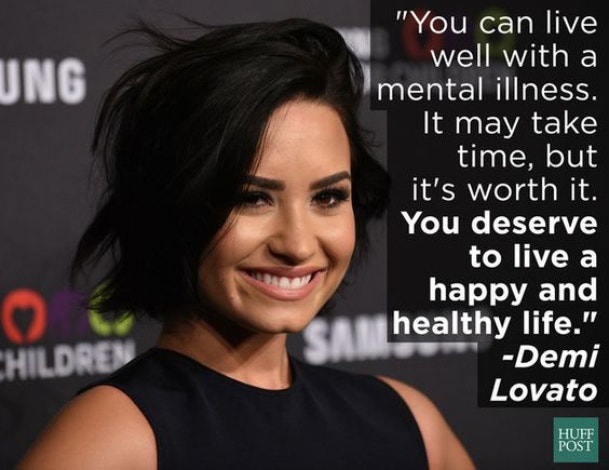Why Is Addiction A Disease For Celebrities, But A Choice For Normal People?
If you care about one addict — why not care about them all?
 instagram
instagram I’m sure everyone has heard by now about Demi Lovato’s latest relapse that sent her to the hospital for an apparent drug overdose. At this point, we’ve all heard and the majority of us are upset to see such a wonderful pop star who has been so ope about her struggles stumble again.
Lovato's overdose brought forth a plethora of outcries for her to “get better” and comments about how “addiction is no joke” from her fans. Most of the responses seemed to be sentiments of “broken hearts” for the star who had seemed to have fallen back into her addictions and encouraging her to “keep fighting.”
When Lovato publicly addressed her relapse and subsequent overdose, she called her journey with addiction an "illness."
But some can’t help but wonder — why is it that when a celebrity struggles with a drug addiction we call it an “addiction” and a “disease,” but then we are quick to write off someone we may know personally (in real life) that struggles with addiction as a “junkie”?
Is addiction a disease or a choice? Apparently, that depends on how rich and famous you are.
Over the years, Demi has been open about her issues with mental illness and addiction (she struggles with bipolar disorder, depression, and anxiety as well as having had issues with eating disorders, cocaine abuse, and alcohol abuse).

Photo: Pinterest // "You can live well with a mental illness. It may take time, but it's worth it. You deserve to live a happy and healthy life."— Demi Lovato
I sort of assumed that her being open about it was why everyone is being so supportive. Maybe it’s the celebrities that are open about it that makes us feel like the addiction is a real issue. Whereas that old hometown friend you know with an addiction probably doesn’t discuss his issues with you and therefore it seems like he/she is just stupidly falling into the same self-destructive behaviors.
Maybe it’s the difference between struggling in the public eye verses struggling in mostly silence, perhaps?
But, that doesn’t really make it that different at all though — does it? The only difference is how much we get to see of the struggle. Someone who is constantly in the public eye wouldn't "choose" to keep going back to drugs, while regular people with addiction do "choose" that life.
I think the biggest issue tends to be a mixture of being annoyed by the people who deny they have a problem versus people that own their problems and actively try to get help (like Demi who checked herself into rehab right after being released from the hospital after her overdose). It’s also probably the selfishness of it not overly affecting our lives when a celebrity has a problem, but as it gets closer to home, it gets more real.
When it comes to the “choice” versus “disease” debate, most people have some pretty strong opinions one way or the other. Generally, these opinions are based on their own emotional baggage and personal experiences.
But, what does the research actually say?
According to the Center on Addiction, “addiction is defined as a disease by most medical associations.” So, basically, medicine and science are on the “disease” side of the issue. Well, most of medicine, anyway …
Dr. Marc Lewis, on the other hand, doesn’t think so. He “reveals addiction as an unintended consequence of the brain doing what it's supposed to do — seek pleasure and relief — in a world that's not cooperating” (he actually wrote a book about it).
Frankly, I don’t see that the definition matters that much. I mean really, the biggest question to me is why are we so judgmental and/or dismissive of people who are struggling and have problems?
According to Psychology Today, before the “disease model” for addiction came around, there were even worse prejudices against people with substance problems. “They were seen as people who were out for their own pleasure without regard for anyone else," Dr. Lance Dodes wrote. "They were viewed as having deficiencies in character.” Basically, they were seen as selfish people with little to no morality.
Dodes doesn’t think that addiction is a “disease” either. He argues that “addiction has very little in common with diseases. It is a group of behaviors, not an illness on its own. It cannot be explained by any disease process. Perhaps worst of all, calling addiction a ‘disease’ interferes with exploring or accepting new understandings of the nature of addiction.”
He proposes that we stop calling it a disease and instead come up with a new way of referring to it. He suggests simply calling it “addictive behavior” as a consequence of psychological issues and thinks that this, “[retains] all the beneficial aspects of the old disease idea” (namely, the “lack of morality” in people with addictions).
Regardless of whether or not it’s actually a “disease,” it seems clear that there are some things that make you pre-dispositioned towards becoming an addict.
For example, according to dualdiagnosis.org, the National Burau of Economic Research has reported that there is a “definite connection between mental illness and the use of addictive substances.” Considering celebrities like Demi Lovato and Robin William's notorious issues with substance abuse and mental illness (Robin Williams was known for struggling with depression and issues with cocaine and alcohol abuse), that seems clear.
But, regardless of the reasons, the question still stands: why is it an “addiction” for some and a “choice” for others?
I mean, technically everyone “chooses” to have their first taste of an addictive substance. So, on THAT level, of course, it’s a choice. However, not everyone becomes addicted. I mean, we all know someone who has tried drugs, hated them, and never touched the stuff again. And we never judge THAT guy as harshly as we judge the one who did the SAME thing but became an addict.
According to Phoenix House, there are three major risk factors for becoming an addict. These risks include:
- Biology (especially your genetic disposition and presence of mental illness)
- Environment (things like socioeconomic status, parental involvement, the presence of abuse, etc.)
- Development (adolescent brains are more at risk for addiction down the road).
So, in the long run it’s not ALL the addict’s “fault,” which we seem to get when it’s a celebrity … but not when it’s a regular, run-of-the-mill addict. Sure, maybe they should have been more aware of their “risk factors” before partaking in risky behavior (or maybe no one should be partaking in risky behavior at all).
The main point here is that all addicts should roughly be treated the same since, more often than not, the situation is roughly the same. I’m not sure why we think celebrities get a “get out of jail free” card when it comes to addiction, but the guy just trying to survive in his “normal life” is suddenly a bad person for struggling with addiction. In the long run, we could all use a little more empathy and a lot less judgment.
Nicole Bradley-Bernard is a writer who needs coffee more than she needs anyone’s approval. She enjoys putting bright colors in her curly brown hair, spending time outside on cool days and being with her partner in life, Eric, who she considers a continuing source of inspiration.

